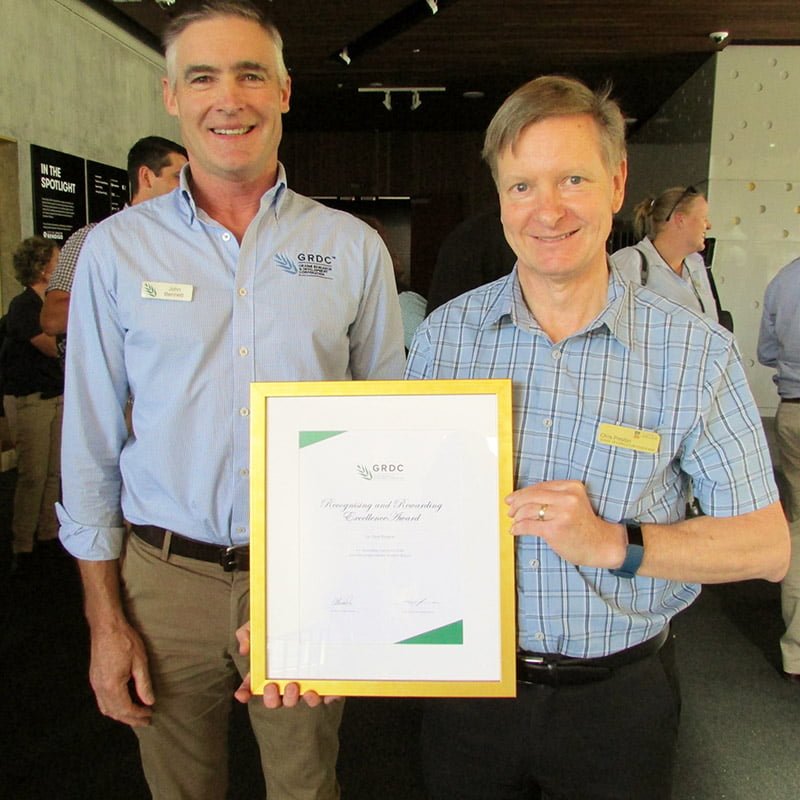When it comes to managing weeds and combating herbicide resistance, Chris Preston is one of the most important and influential resources available to our grain growers.
Dr Preston is seen by growers, their advisers and the broader grains industry as an accessible and reliable authority on weed management, and many farming systems throughout the southern cropping region, especially, have benefited from his knowledge and insights.
His long-standing contribution to the grains industry has now been officially acknowledged by way of the Grains Research and Development Corporation (GRDC) Southern Region 2018 Recognising and Rewarding Excellence Award.
The award, voted upon by the GRDC Southern Regional Panel, recognises Dr Preston’s input and commitment to the Australian grains industry.
In presenting the award, GRDC Southern Regional Panel member John Bennett said Dr Preston, Associate Professor of weed management at the University of Adelaide’s Waite Campus, was one of the grains research, development and extension sector’s most valued assets.
“Chris works in an area of research that is constantly evolving and enormously complex. His studies are very much at the cutting-edge and he is a global leader in the science behind management of weeds and the dynamics of herbicide resistance,” Mr Bennett said when presenting the award at the GRDC Grains Research Update in Bendigo (Victoria).
“Yet, he possesses a unique ability to transfer that knowledge to growers and advisers in a practical manner that is easy to digest, leading to rapid practice change on-farm.
“He recognises the importance of extending his learnings to those who most need to know – including growers such as myself – and as an industry we are truly thankful for his dedication in that regard.”

Chris Preston (right) receives the GRDC Southern Region 2018 Recognising and Rewarding Excellence Award from GRDC Southern Regional Panel member John Bennett, at the GRDC Grains Research Update in Bendigo

Dr Preston works on numerous GRDC research investments, including those relating to improving integrated weed management (IWM) practice of emerging weeds in the southern and western regions; the mechanisms, evolution and inheritance of resistance; weed management in southern mixed farming systems; new uses for existing chemistry; surveillance of herbicide resistant weeds in cropping regions; and improving weed management in pulse crops through herbicide tolerance.
He sits on several industry committees and chairs the Australian Glyphosate Sustainability Working Group, a collaborative GRDC-supported initiative involving research, industry and extension representatives with the purpose of promoting the sustainable use of the herbicide glyphosate in Australian agriculture.
When he’s not in the field, the glasshouses or the laboratory, Dr Preston can often be found presenting his research findings at various GRDC Grains Research Updates, and other industry forums and field days across the nation.
At other times he will be mentoring students, supporting fellow researchers, writing research papers (he has published around 100 peer-reviewed papers and book chapters), and advising various agricultural companies, industry bodies and government agencies about herbicide resistance issues.
Dr Preston is a former winner of the GRDC Southern Region Seed of Light award, which recognises outstanding communications in the delivery of grain industry research.
“Wherever Chris goes, he is very well received,” Mr Bennett said. “He is engaging, genuinely interested in the issues confronting growers and loves to interact with his audience. He is a leader in his field of research but also a leader in delivering the outcomes of that research.
“As a grower, I can confidently implement practice change based on Chris’s advice. His research is thorough and he has the results and data to underpin his recommendations, so I know that any changes I make within my farming system will be effective.”
The Recognising and Rewarding Excellence Award is a financial scholarship and can be used for travel or another agreed activity to further the skills or expertise of the recipient.
“Through this award, Chris will be provided with an opportunity to network and strengthen linkages with other world-leading researchers to identify relevant research and technologies for potential adoption here in Australia,” Mr Bennett said.
Source: GRDC
